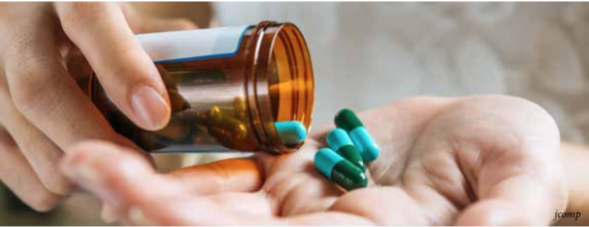Medication safety
When you or a family member reach into your medicine cabinet are you confident that the medications are safe? There are important safety factors to consider when keeping medication in your home, disposing of medication, and taking medications. Medications must be kept in the proper storage area to be most effective. It is also important that they are stored safely to prevent ingestion by the wrong persons in your household such as children and the elderly. There are additional safety measures that should be taken when traveling.
Take time to look at the dates on all your medications both over-the-counter and prescription. Examine vitamins, supplements, sunscreens, drops, sprays, and lotions. Discard if there is any discoloration, smell, change in consistency, or change in taste of oral medications. If liquid or injectable medications have not been stored at the proper temperature and exposed to excessive heat or cold, this can disrupt their efficacy. Insulin is especially sensitive to heat and cold and requires proper storage in a cold pack or keeping it near your body to avoid freezing. Read the label carefully to determine if light exposure or exposure to moisture or heat causes a change in the medication's effectiveness. Many people like to keep their daily medications in their kitchen to remember to take them. Avoid placing meds near your stove to prevent heat exposure.
Unwanted, unused, or expired medications can be properly disposed of in many pharmacies or hospitals in their safe medication disposal drop box. Most items are accepted except for needles, thermometers, illegal drugs, and hydrogen peroxide. Accepted items are indicated on the front of the boxes at the pharmacy or hospital location. There are drug disposal drop-off days that are held in many local communities. October 29th, 2022, is the next National Prescription Drug Take Back Day. It aims to provide a safe, convenient, and responsible means of disposing of prescription drugs, while also educating the general public about the potential for abuse of medications. If a drug disposal box or program is not available to you many drugs can be disposed of in household trash with the following practices:
-
Remove drugs from original containers and mix them with moist dirt, kitty litter, and coffee grounds, and place them in a sealed plastic bag. This makes it unappealing for children, animals, or drug seekers to go through.
-
Shred any medication labels with Rx numbers to protect your privacy and identity.
-
Do not flush medications down the sink or toilet to avoid contamination in the water system.
On the label of prescription medications, you will see a notation of discard after date. This is important to take note of since expired medications can be less effective in their strength or actions. If they become less potent, as with antibiotics, they can fail to treat an infection leading to more serious illness. Nitroglycerin used for chest pain loses its potency over time, which is very dangerous. Some medications change in chemical composition when exposed to air or handling. According to the FDA, some expired medications such as eye drops are at risk of developing a bacterial microorganism causing infections.
Over-the-counter medications, lotions and sprays, and drops all have a date of expiration. These products can lose the potency of the active ingredients. A pain reliever or an anti-inflammatory can be less effective if used beyond the use by date. Insect sprays effectiveness is reduced when these products are old or have been repeatedly used over time and past the date. Eye drops when opened and used frequently can become contaminated when expired.
When traveling with medications domestically you do not have to report the medications. If you have liquids that are more than the permitted 3.4 ounces you must notify the TSA checkpoint before baggage screening. While it is permitted to place medications in your luggage and carrying-on, it is best to place them in the carry-on to avoid drastic temperature changes in the baggage area and the possibility of lost baggage with your meds. TSA does not require prescription labels on bottles, but some states have individual laws. When traveling internationally it is best to have labels on all medications from a pharmacy and to have copies of your prescriptions in case of need for emergency refills.
Additional safety tips for medications include:
-
Take medications as directed and until the prescription especially antibiotics is finished, unless otherwise instructed by your MD
-
Do not double up on medications if you forgot or if you feel they aren’t working
-
Don’t take someone else’s medications
-
Discuss with your pharmacist precautions for possible medication interactions
-
Keep your medication lists up to date
Medication manufacturers are guided by FDA recommendations on setting expiration or use by date on their products. If they have been properly stored, they will maintain their effectiveness. Take time to look at medications in your home and workplace and properly dispose of those that are expired. This will give you confidence that what you are taking is the most effective product to maintain your good health. Choose safety for you and your family.
For more questions contact your local pharmacy. https://www.mvmedcenter.org/our-services/pharmacy

